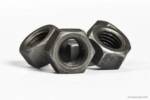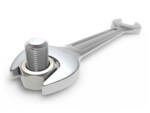Dane's FAQs
For this FAQ, we are focusing on the 304/316 alloys and their common, default strength conditions. Within both F594 and A194, there are many less common, exotic grades and multiple strength conditions. Exploring all possible permutations of all grades would be unnecessarily complicated. For more details, the actual ASTM standards can be purchased from ASTM,... Read more

Snug tight is defined by the AISC/RCSC as when all the plies in a connection have been pulled into firm contact by the bolts in the joint, and the bolts have been tightened sufficiently to prevent removal of the nuts without a wrench. They go onto say that this is typically achieved by a few... Read more
In December 2015, ASTM committee F16 approved the new F3125 standard, which combined six structural bolt standards, A325, A325M, A490, A490M, F1852, and F2280. The goal was to clean up inconsistencies within those various standards and combine them, so that future updates would be easier and less costly. The goal was not to drastically change... Read more
In December 2015, ASTM committee F16 approved the new F3125 standard, which combined six structural bolt standards, A325, A325M, A490, A490M, F1852, and F2280. The goal was to clean up inconsistencies within those various standards and combine them, so that future updates would be easier and less costly. The goal was not to drastically change... Read more
The bars we use to manufacture your bolts are rolled by the steel mill with standard tolerances for diameter, out of roundness, and straightness. ASTM A6 covers many of these tolerances, as well as the chemical and dimensional tolerances for other shapes and plates. Because round bar is what we primarily use, we will stick... Read more
Yes. Per the RCSC Specification for Structural Joints Using High-Strength Bolts (2014), section 8.2, it says: “When it is impractical to turn the nut, pretensioning by turning the bolt head is permitted while the rotation of the nut is prevented, provided that the washer requirements in Section 6.2 are met”
Although ASME B18.2.1 allows for reduced body diameter bolts (where the unthreaded shank is equal to the pitch diameter of the threads), the American Wood Council does not. In Section 13.1.3.3 of the 2015 National Design Specification for Wood Construction, it says: “Bolts used with split ring and shear plate connectors… shall have an unreduced... Read more
The turn of the nut method is a very popular and reasonably reliable method for tensioning (F3125) A325 and A490 structural bolts without the need for expensive torque wrenches or tension measuring devices. It is a simple guide that tells the user to rotate the nut a specified amount depending on the bolt length and... Read more

The reason is similar but different for the drop in strength of grade 2 and grade 5 fasteners. For J429 grade 2 fasteners, the drop is due to the manufacturing process. Small, mass produced cap screws are cold formed by drawing and forming wire. The wire, as it is cold formed, work hardens which increases... Read more
A194 grade 7 nuts are commonly used nuts for both high temperature and low temperature applications, and is commonly paired with bolts made to either A193 or A320. When used in conjunction with A320 bolts in a low temperature application, or if specially requested, they are charpy tested to assure they will perform well in... Read more

